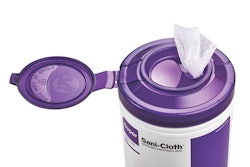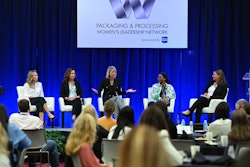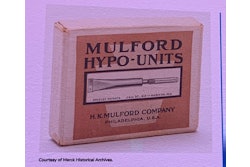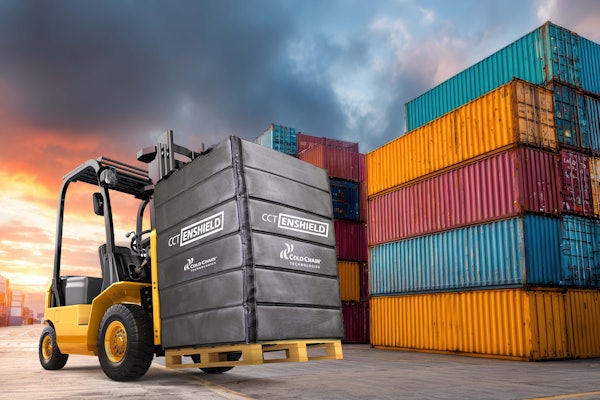Quick hits:
- If employees maintain their efficiency, remote work should be embraced.
- Remote employees open up a world of talent and opportunity for companies.
- An individualistic, customized approach must be taken in order to attract women back into the workforce.
Related to this episode:
- PMMI's Packaging & Processing Women's Leadership Network
- Wicked Good Cupcakes' Tracey Noonan Keynotes PPWLN Breakfast
- unPACKed Podcast: Wicked Good Insight on The New World of Work
- Gain an in-depth look at PMMI's research on automation and hear from experts on industry topics by visiting PMMI's Business Intelligence video library.
- HERMA’s 132M applies wrap-around labels to bottles & vials at speeds up to 400 PPM. Visit their website for more information. →
 | Read the transcript below: |
Melissa Griffen: Hi, I’m Melissa Griffen, Contributing Editor for Healthcare Packaging. This PACK EXPO Las Vegas 2021 featured the Packaging & Processing Women’s Leadership Network breakfast where Editor-in-Chief of OEM Magazine, Stephanie Neil, conducted a panel with keynote speaker, Tracey Noonan, the CEO and Co-founder of Wicked Good Cupcakes; Sharron Gilbert, president and CEO of Septimatech and co-chair of PPWLN; Jan Tharp, president and CEO of Bumblebee Seafood Company, and other co-chair of PPWLN; and Yolanda Malone, vice president of Global R&D Foods Packaging at PepsiCo.
PMMI’s Packaging & Processing Women’s Leadership Network serves to connect, recruit, retain, and advance women’s careers within the packaging and processing industry. PPWLN offers a number of tools, including videos, podcasts, and events, both online and in person, throughout the year.
The panel’s theme was the new world of work that has developed since COVID. Let’s see what Jan had to say about employee quality and opportunities inside the company, as surrounds remote work.
Jan Tharp: During COVID, we have hired several people at executive levels and most of them are not required to move to San Diego, where we are based. It's actually opened up a whole new world of talent for us. And when we look at that and we think, “Well, how do we get the best and the brightest? Well, the best and the brightest may not want to move to San Diego.”
We've got to embrace the fact that this is not the same world that we were all living in two years ago. And I think we're in the middle of it. If you look at COVID as a book, there are chapters of the book and I think we're someplace in the middle. And I don't have all the answers, but I do know that we have a huge opportunity to allow people to be the best versions of themselves, and give them the flexibility, and say, "You know what, take a look. There's a lot of negative with COVID, but let's focus on the positive."
The positive for us is we've been able to attract rockstar talent into our company by being a little more open with respect to where people actually do that work. Is that going to prevent them from getting opportunities? No. I think that leads into another discussion of ‘How are you effective in this new world of work?’ If you're not in the boardroom anymore and you're on a computer, it's a different toolbox. This puts a little bit more pressure on the team member to say, "If you want to live in Antarctica, and you've got an internet connection, and I don’t need to know you’re living in Antarctica and you can still be as effective, then I'm going to embrace that."
Melissa Griffen: Stephanie leaned on a survey that showed that the majority of women who consider themselves the primary caregivers to children under 18, who lost their jobs or decided to return home to take care of those children due to the pandemic, are not planning to return to the workforce. Jan provides some thoughts on how to incentivize them:
Jan Tharp: If you look at pre COVID and you look at manufacturing, it was all about customization and finding products that were very much individualistic. If you could take that thinking, and move it over to human resources and say, “We’re going to become very individualistic, we’re going to become customized in how you go out attracting talent.” Everybody’s different.
You look at it and say, "Okay, this person has children. They may need a different work environment. They may need different work times." You can be flexible with that. Then, I think you can attract people. I think it’s when you are rigid, or you think that it is a one-size-fits-all – I hope that if anything comes out of COVID it is that we realize there is no such thing as one size fits all. It doesn’t. We need to understand and embrace that every single one of us is different.
Melissa Griffen: The discussion continued to include a generally more diversified workforce. Let’s hear what Sharron and Yolanda had to say on the topic:
Yolanda Malone: Our corporation actually recognized that we do have a gap of women leaders, Black, Hispanic leaders in the organization, both male and female. And it's part of the culture of having the dialogue of what's missing. How do we connect in understanding?
But also, as you said, it's flexibility. What does work look like for you with a job in order to advance? What are you looking for? And being flexible and understanding. And I think the culture really helps to set that. When you think about coming into work and what are my opportunities, but walking the walk as you talk the talk.
And I think for PepsiCo, that's what we're striving to do is ensure that we're not just saying it's really nice to have a diverse leadership team, we're actually progressing and showing that we're serious about it. We're hiring more leaders that are Black and Hispanic talent. We're showcasing them within our ranks, on our boards, as we do some major changes.
Sharron Gilbert: Yes we're always looking for diversity in our workforce. And we're reaching into the different schools that are local to us, trying to put together some programs, but work with our employees too. It's word of mouth as well. And as Jan was saying, the flexibility in the workplace, job sharing, part-time, it’s not necessarily 9 to 5, Monday to Friday anymore, it's 24/7. And what works best for their families?
And it's not necessarily we're finding the women who need some support, it's a lot of our male counterparts as well, who also are trying to juggle family as well. So just again, trying to be really creative. And schools seem to be a big part of it. And then the word of mouth.
Melissa Griffen: Watch the full panel and keynote at the URL on screen and check out our podcast with Tracey Noonan. Thanks and see you next time on Take Five Video with Healthcare Packaging.






















